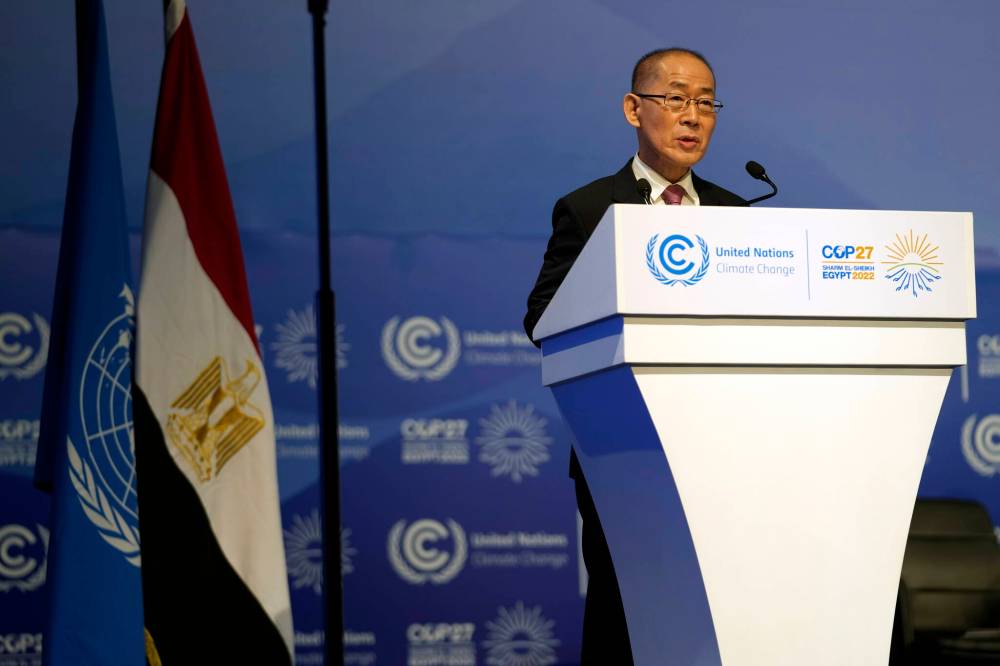Climate crisis key issue in upcoming election
Read this article for free:
or
Already have an account? Log in here »
To continue reading, please subscribe:
Monthly Digital Subscription
$1 per week for 24 weeks*
- Enjoy unlimited reading on winnipegfreepress.com
- Read the E-Edition, our digital replica newspaper
- Access News Break, our award-winning app
- Play interactive puzzles
*Billed as $4.00 plus GST every four weeks. After 24 weeks, price increases to the regular rate of $19.95 plus GST every four weeks. Offer available to new and qualified returning subscribers only. Cancel any time.
Monthly Digital Subscription
$4.99/week*
- Enjoy unlimited reading on winnipegfreepress.com
- Read the E-Edition, our digital replica newspaper
- Access News Break, our award-winning app
- Play interactive puzzles
*Billed as $19.95 plus GST every four weeks. Cancel any time.
To continue reading, please subscribe:
Add Free Press access to your Brandon Sun subscription for only an additional
$1 for the first 4 weeks*
*Your next subscription payment will increase by $1.00 and you will be charged $16.99 plus GST for four weeks. After four weeks, your payment will increase to $23.99 plus GST every four weeks.
Read unlimited articles for free today:
or
Already have an account? Log in here »
Hey there, time traveller!
This article was published 28/03/2023 (1063 days ago), so information in it may no longer be current.
It’s nothing we haven’t heard before: human-caused climate change is threatening the livability of our planet and if we don’t drastically reduce our greenhouse gas emissions, the damage will be irreparable. What’s different is the urgency.
The Intergovernmental Panel on Climate Change released its sixth assessment report last week. The wide-ranging document synthesizes the global progression, impacts, adaptation and mitigation of the climate crisis since the previous such report in 2014. The findings are dire, with some calling the report a “final warning.”
The Earth’s atmosphere has already warmed by 1.1 C above pre-industrial levels and we’re on track to hit, and likely overshoot, the 1.5 C threshold regarded by scientists as the tipping point for many ecosystems by 2030. The actions we take in the next seven years will determine the viability of the next thousand.
“There is a rapidly closing window of opportunity to secure a livable and sustainable future for all,” reads the report.
“There is a rapidly closing window of opportunity to secure a livable and sustainable future for all,” reads the report.
It’s difficult to comprehend the magnitude of the existential threats facing civilization and it’s easy to think of the crisis as a future problem. But the climate has already changed.
The warmest years on record have all happened in the last decade and extreme weather events are becoming more frequent in every region. Water sources, food production, infrastructure and economies are being hampered by warmer conditions. Mass human and animal migration is underway.
So, where do we go from here?
The IPCC report is clear that the fossil fuel-laden trail we’re currently blazing is a road to ruin. It’s also clear change is possible through collective and individual action. Governments at every level need to prioritize climate action and enact policies that enable citizens and industries to reduce their environmental impact.
Peter Dejong/The Associated Press Files IPCC Chairman Dr. Hoesung Lee. The IPCC report is clear that the fossil fuel-laden trail we’re currently blazing is a road to ruin.
Manitoba is in an election year and while there are many important issues at stake, the climate crisis must be a key campaign consideration for voters and candidates alike.
Outside of a candidate forum here and a platform mention there, the environment rarely gets the attention it deserves during election cycles. As an issue, it’s often overshadowed by day-to-day concerns, such as health care, crime and affordability.
Unfortunately, these seemingly more pressing problems will only be exacerbated by a worsening climate crisis. At the same time, climate resilience and sustainable development, according to the IPCC report, has the potential to improve human health, grow our economies and make our cities more livable.
“I don’t think we talk about the possibilities of that better future nearly enough,” Canadian climate scientist Katharine Hayhoe said in a recent CBC radio interview.
Manitoba is in an election year and while there are many important issues at stake, the climate crisis must be a key campaign consideration for voters and candidates alike.
And in Manitoba, there are many opportunities for improvement.
Transportation remains our biggest emission source, yet the province provides no rebates for electric vehicle ownership. With ample access to relatively clean hydroelectricity, Manitoba is well-positioned to transition its energy grid away from fossil fuels. With more funding, Efficiency Manitoba has the potential to make the province’s home and building stock greener. Financial incentives can help agriculture and industry make environmental improvements.
Whichever party rises to power in October will be responsible for setting the tone of our emissions trajectory at a critical time in human history. We need leadership willing to think beyond the next four-year term and make beneficial decisions for generations to come.












